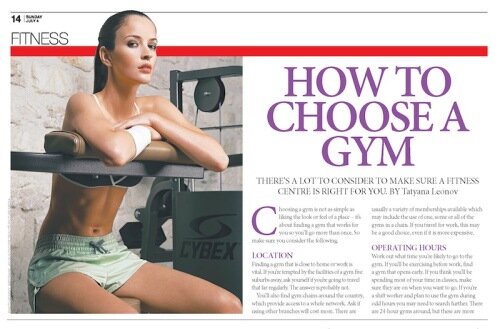How To Choose a Gym
There’s a lot to consider to make sure a fitness centre is right for you. By Tatyana Leonov
Choosing a gym is not as simple as liking the look or feel of a place – it’s about finding a gym that works for you so you’ll go more than once. So make sure you consider the following.
Location
Finding a gym that is close to home or work is vital. If you’re tempted by the facilities of a gym five suburbs away, ask yourself if you’re going to travel that far regularly. The answer is probably not.
You’ll also find gym chains around the country, which provide access to a whole network. Ask if using other branches will cost more. There are usually a variety of memberships available which may include the use of one, some or all of the gyms in a chain. If you travel for work, this may be a good choice, even if it is more expensive.
Operating hours
Work out what time you’re likely to go to the gym. If you’ll be exercising before work, find a gym that opens early. If you think you’ll be spending most of your time in classes, make sure they are on when you want to go. If you’re a shift worker and plan to use the gym during odd hours you may need to search further. There are 24-hour gyms around, but these are more prevalent in larger cities and sparse in rural locations. Also ask about holiday operating policies.
Facilities
Gyms vary greatly in what they offer. Some have swimming pools, others have spas or saunas. The key is deciding what you’ll use. A swimming pool may mean there are classes such as aqua aerobics, which is advocated for people with injuries, joint problems, arthritis or back pain. Some niche gyms specialise in a certain physical activity, so might, for example, include a boxing ring or a climbing wall.
Equipment
Ask to test out the equipment to make sure it is well maintained and that there is a wide variety available. If you prefer free weights, check that there’s a large selection; during busy times these could be hard to come by. If you prefer to use guided machines, look for a range so you can work all the muscles of the body.
Cardio machines should also be plentiful – treadmills, cross-trainers, rowing machines, bikes and steppers are some of the more common machines you’ll find in most gyms. Additional equipment should include fitness balls and mats for floor exercises.
Group fitness classes
Structured programs work well for some, while others prefer solitary exercise regimes. If you enjoy classes, find a gym that has a mix of weights, aerobics and cycle classes throughout the day. Yoga and Pilates are also great options to have available.
Outdoor training has become popular recently. Check if participating in these sessions will incur an extra cost. If you prefer to work out on your own you may still benefit from joining a gym that offers group classes as this could be just the thing to kick you back into a regime if you become bored doing the same thing.
Staff
There should be plenty of knowledgeable floor staff around. And make sure they are qualified– ask about the training staff undertake before signing up. Depending on the type of membership you take up, working out with a personal trainer may be included.
Additional benefits
Some gyms offer physiotherapy, massage therapy, nutritional counselling and sports therapy at a discounted rate to members. Some have childcare facilities or cafes, with member discounts on purchases.
Costs
Gym prices vary depending on the services offered and the duration of the membership. It’s important to work out what you want and what you’re willing to spend. If you only use weight machines, you don’t need a flashy gym that has child minding, a pool and a sauna. Trial a few gyms and compare prices before you decide.
Contract
Take your time with the fine print. Contracts will vary across institutions and from state to state, but a good contract should protect the interests of both the club and the member. Don’t be afraid to ask questions if something isn’t clear. Does the gym offer a cooling-off period? Can you put the contract on hold if you go overseas or become ill? If you move, can you cancel the contract without a penalisation fee? Does the contract roll over to another contract once completed? (This means you will be signed up again even if you didn’t want to be).
Other issues
What is the parking like? If you plan to drive to the gym you’ll want easy access and free parking (though this may not be realistic).
Cleanliness is vital. Make sure there are paper towels and disinfectant spray bottles at different locations so you can wipe down equipment. The toilets and showers should also be clean.
Check the locker room for storage space. Population density is another thing to consider. If the gym is crowded during the times you plan to go, your experience may not be as enjoyable. You might waste valuable time lining up to use machines or miss out on classes.
Shop around
To get the most out of your membership, watch out for:
• Free trial days or weekends.
• Discounted off-peak memberships.
• Pay-as-you-go options.
• Waived joining fees.
• Cheap trial memberships.
And don’t be afraid to bargain!
Types of gyms
Many universities and social clubs have public gyms you may join. You could also think of joining:
• A women-only gym: These have recently taken the country by storm and be found in every state.
• A gym for mums: Many have child-minding facilities and some offer Mums and Bubs classes.
• A gay-friendly gym: These are more common in the larger cities.






